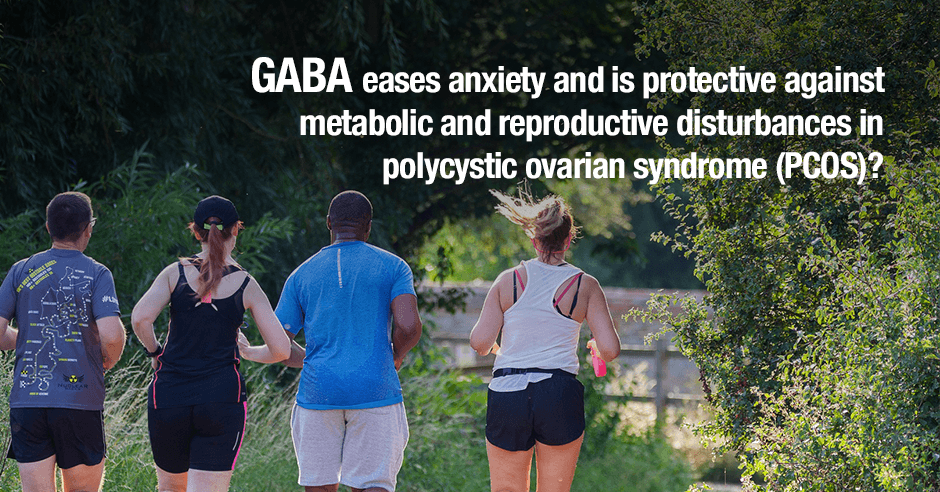
This question was recently asked in my online GABA Quickstart group program: What are your thoughts about using GABA with somebody who has polycystic ovarian syndrome (PCOS)? Are there any contraindications? My approach is always the same regardless of your diagnosis – if you have the low GABA symptoms of physical anxiety then it’s worth doing a trial to determine if supplementing with the calming amino acid GABA will help.
What is very interesting is that this rat study, Protective effects of GABA against metabolic and reproductive disturbances in letrozole induced polycystic ovarian syndrome in rats, reports some very specific benefits of GABA being protective against metabolic and reproductive disturbances in PCOS.
Letrozole or Femara, a non-steroidal aromatase inhibitor (i.e. it lowers estrogen production) is used to treat breast cancer in postmenopausal women and it induced PCOS in the rats.
The following benefits were found when GABA was used in the rats with PCOS:
- reduced body weight
- reduced body mass index
- reduced testosterone
- a favourable lipid profile
- normal glucose tolerance
- a decreased number of cystic follicles in the ovaries
These results are profound. But wait for it …”the effects observed with GABA were comparable to that with metformin” with none of the side-effects (which can actually include anxiety, a racing heart, shakiness and depression).
The authors conclude as follows:
The results suggest that GABA treatment has shown protective effects in PCOS and provides beneficial effects either by reducing insulin resistance or by inducing antioxidant defence mechanisms.
The above paper didn’t measure anxiety levels but it’s very common with PCOS. According to this paper, Polycystic Ovary Syndrome: A Review of Treatment Options With a Focus on Pharmacological Approaches
after PCOS is diagnosed, studies show that more than 50% of patients develop prediabetes or diabetes, and there is an increased risk of myocardial infarction (MI), dyslipidemia, hypertension, anxiety, depression, endometrial cancer, and sleep apnea.
So it makes sense that using GABA will also help to ease any anxiety symptoms that are present. As always, look at the low GABA symptoms and if they exist rate them on a scale of 1-10 (with 10 being most severe), do a trial with GABA, and rate your symptoms afterwards, adjusting up or down as needed based on symptom relief.
A quick recap if you are new to GABA, these are the symptoms of low GABA:
- Unable to relax or loosen up
- Stiff or tense muscles
- Feeling stressed and burned-out
- Feeling worried or fearful
- Panic attacks
- Craving carbs for relaxation and calming
- Craving alcohol for relaxation and calming
- Craving drugs for relaxation and calming
- Insomnia *
- Have intrusive thoughts, perseverate or have an overactive brain
Or have unwanted thoughts – thoughts about unpleasant memories, images or worries (Updated Nov 17, 2017: new GABA research on intrusive thoughts) * - Inability to prioritize planned actions *
- Acrophobia (fear of heights) * – possibly other phobias too
- Poor focus *
- Rectal spasms *
- Burning mouth *
- Visceral pain/belly pain with IBS *
(* New additions that are not in my book “The Antianxiety Food Solution”)
Keep in mind that the above PCOS GABA paper was an animal study and GABA was not listed as a treatment option in the second paper above so my approach would be to use GABA for easing the physical anxiety symptoms. At the same time, share this blog and study with your prescribing physician and request if they will work with you to adjust your Metformin as they monitor your testosterone, lipids, glucose, insulin and cystic follicles in the ovaries, as well as weight and body mass index.
I look forward to human GABA PCOS studies in the near future. I also look forward to hearing back from you if you have PCOS and are using GABA for easing your anxiety symptoms AND are also seeing some of the above metabolic and reproductive improvements.
Given the prevalence of PCOS it’s important we use everything at our disposal to help:
Research suggests that 5% to 10% of females 18 to 44 years of age are affected by PCOS, making it the most common endocrine abnormality among women of reproductive age in the U.S. Women seeking help from health care professionals to resolve issues of obesity, acne, amenorrhea, excessive hair growth, and infertility often receive a diagnosis of PCOS.
We must always use a comprehensive approach and this book by my friend and colleague, Amy Medling is wonderful: Healing PCOS.
Do you have PCOS and anxiety and has GABA helped? Have you also observed some of the above metabolic and reproductive improvements?
If you’re a practitioner working with women with PCOS, have you made any of these observations?
I’d also be curious to hear if you see changes in acne severity, amenorrhea (missed periods), excessive hair growth or infertility?
Please do share in the comments below.


